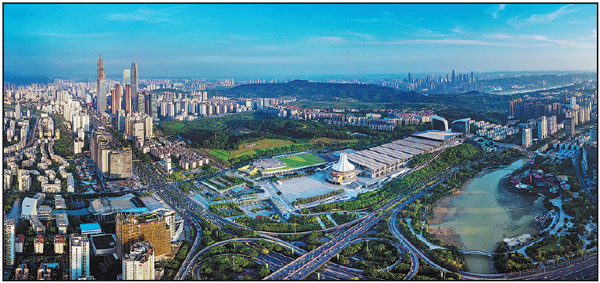Overview

Nanning, capital of Guangxi Zhuang autonomous region. [Photo by Wu Zhiyong/For China Daily]
The State Council approved the establishment of the Guangxi Zhuang autonomous region on March 5, 1958.
Located in the southern part of the motherland, Guangxi Zhuang autonomous region connects Guangdong province in the east, neighbors Beibu Gulf in the south and faces Hainan province across the sea. It borders Yunnan province in the west, Hunan province in the northeast, Guizhou province in the northwest, and the Socialist Republic of Vietnam in the southwest. Guangxi covers an area of 237,600 square kilometers, and administers the Beibu Gulf area of approximately 40,000 sq km.
Forty percent of the total land area in Guangxi is a hilly basin landform. The plain mainly consists of alluvial river plains and an erosion plain. The largest Xunjiang River plain has an area of 630 square kilometers. The main peak of Maoer Mountain in the marginal mountains of the basin is 2,141 meters above sea level, the highest peak in South China. The karst landform is widely distributed in the southwest, northwest, central and northeast of Guangxi, accounting for 37.8 percent of the total land area. The extent of this formation is very rare in the world.
Guangxi is in the subtropical monsoon climate zone, with an average annual temperature of 17.6 to 23.8 C, average annual rainfall of 723.9 to 2983.8 millimeters, and average annual sunshine of 1,231 to 2,209 hours. As a multi-ethnic inhabited region, there are 12 native ethnic groups namely Zhuang, Han, Yao, Miao, Dong, Mulam, Maonan, Hui, Jing, Yi and Shui and Gelao, and there are 44 other ethnic groups including Manchu, Mongolian, Korean, Tibet, Li and Tujia. Zhuang is the most populous minority in Guangxi and China. The Zhuang people mainly live in the cities of Nanning, Liuzhou, Chongzuo, Baise, Hechi and Laibin. Jingxi has the highest proportion of Zhuang population, with a ratio of 99.7 percent. The Han people are distributed throughout the country, and in Guangxi live mainly on the south coast and in the east.
Guangxi has rich natural resources including minerals, marine life and animal and plant resources. There are large reserves of many minerals, especially aluminum, tin and other non-ferrous metals. Guangxi, with an area of about 900 hectares of mudflats, is one of the 10 key non-ferrous metal production regions in China. Its mangroves cover a total area of 9,300 square kilometers, accounting for 40 percent of the national total. Beibu Gulf is not only a famous fishing ground in China, but also a treasure house of the world's marine biological species. The world-famous Hepu Pearl is produced in this area. In addition, Guangxi has 149 rare and precious species under state protection, accounting for 45 percent of the national total. Guangxi also has 24 animal species under level 1 national protection, 27 percent of the national total.
Rich tourism resources and unique ethnic customs are also a major attraction of Guangxi. The main boutique scenic spots in Guangxi include Guilin Culture and Leisure Resort, Nanning Business Exhibition Lyudu Cultural and Tourism Area, Binhai Tourism Area based on Beihai Beach, Leye Dashiwei Tiankeng Group National Geopark, Detian Transnational Waterfall Tourism Area, Guidong Religious Scenic Site Historical and Cultural Tourism Area, Hezhou Shanshui Ancient Town Ecological Cultural Area, Zhuang-Yao-Miao-Dong-Ethnic Customs Eco-tourism Area in central Guangxi, "Three Sacred" Tourist Area in Laibing and Jinxiu and South China Border Customs Tourism Area with Pingxiang and Jingxi as the core.
As the long-term host of the China-ASEAN Expo, Guangxi has important advantages. Other conferences such as the Pan-Beibu Gulf Economic Cooperation Forum not only promote economic development in the region, but also help the world better understand Guangxi.
Guangxi will continue to exert its advantages to promote economic prosperity, ecological development and improvement of people's living standards, and to shine on the world stage.
